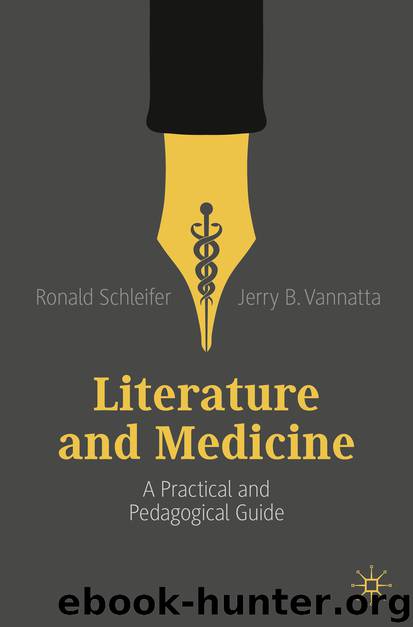Literature and Medicine by Ronald Schleifer & Jerry B. Vannatta

Author:Ronald Schleifer & Jerry B. Vannatta
Language: eng
Format: epub
ISBN: 9783030191283
Publisher: Springer International Publishing
Character, Ethics, and Mystery
In Chekhov’s writing—we’ve seen it already in Chap. 4—his characters confront particular crises in life, which is precisely where a career in healthcare frequently positions those who, as Anatole Broyard notes, routinely face “the crisis of [their patient’s] life” (1992: online). The power of Chekhov’s story here is that it is “twice told”: two characters, physician and aristocrat, face the terrible loss of child and spouse so that Chekhov is able to describe the workings of the absence of virtues—including what we take to be an overriding virtue of “decency”—that are encountered, but not fully understood, in the vignette in this chapter.
In The Chief Concern of Medicine , we note six virtues that are particularly useful in healthcare practices. They are Decency, Discernment, Conscientiousness, Trustworthiness, Compassion, and Competence (see The Chief Concern: 294–295). (It is instructive to note their relation to the Professional Milestones set forth in Appendix 5 since the latter were developed in order to recognize and instill professional healthcare comportment while the former grew out of engagements with literature.) In The Chief Concern we even offer an acronym to help people remember these enumerated virtues: “Doctor Dogood Comforts The Crying Child.” One possible exercise in reading “Enemies” might be to consider the degree to which Dr. Kirilov exhibits these virtues, even in the face of his devastating loss, much as the Professional Workshop considers the degree to which Dr. Franciscus in Richard Selzer’s story exhibits professional milestones. Do the “undeserved insults” Kirilov and Abogin fling at one another—“unjust, cruel, and absurd”—help us discern “virtuous” human interaction? Would virtues, then, be “just, kind, sensible”? Is “the egoism of the unhappy” a form of arrogance? What is the relationship of arrogance to virtue?
Download
This site does not store any files on its server. We only index and link to content provided by other sites. Please contact the content providers to delete copyright contents if any and email us, we'll remove relevant links or contents immediately.
| Ancient & Classical | Arthurian Romance |
| Beat Generation | Feminist |
| Gothic & Romantic | LGBT |
| Medieval | Modern |
| Modernism | Postmodernism |
| Renaissance | Shakespeare |
| Surrealism | Victorian |
4 3 2 1: A Novel by Paul Auster(12375)
The handmaid's tale by Margaret Atwood(7757)
Giovanni's Room by James Baldwin(7326)
Asking the Right Questions: A Guide to Critical Thinking by M. Neil Browne & Stuart M. Keeley(5758)
Big Magic: Creative Living Beyond Fear by Elizabeth Gilbert(5754)
Ego Is the Enemy by Ryan Holiday(5413)
The Body: A Guide for Occupants by Bill Bryson(5080)
On Writing A Memoir of the Craft by Stephen King(4935)
Ken Follett - World without end by Ken Follett(4723)
Adulting by Kelly Williams Brown(4565)
Bluets by Maggie Nelson(4547)
Eat That Frog! by Brian Tracy(4525)
Guilty Pleasures by Laurell K Hamilton(4439)
The Poetry of Pablo Neruda by Pablo Neruda(4097)
Alive: The Story of the Andes Survivors by Piers Paul Read(4018)
White Noise - A Novel by Don DeLillo(4002)
Fingerprints of the Gods by Graham Hancock(3996)
The Book of Joy by Dalai Lama(3976)
The Bookshop by Penelope Fitzgerald(3844)
